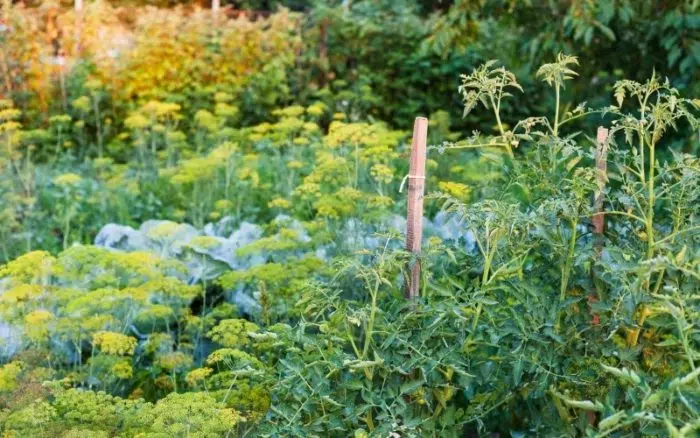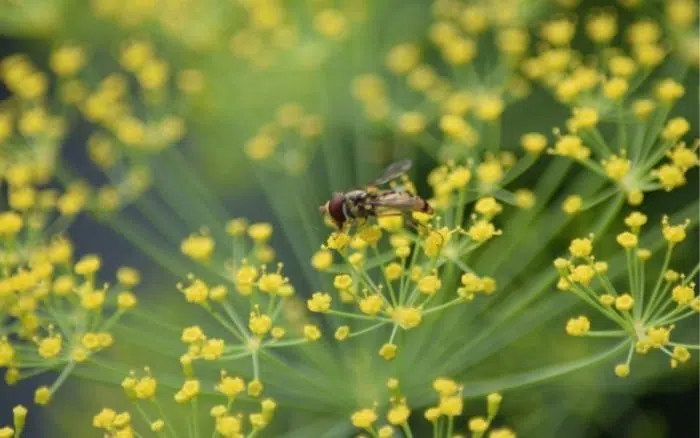While it’s relatively easy to grow dill in your garden, there are some plants that make better neighbors than others for dill.
There are a number of plants that make great partners for dill, including cabbage, asparagus, and onions. These plants share many of the same growing requirements as dill, and dill can help keep some of the pests they typically suffer from away.
What Dill is Good For?
Dill is great at repelling insects like aphids, spider mites, cabbage worms, and loopers from nearby plants. It will also attract parasitic wasps, hoverflies, ladybugs, and other beneficial insects as a companion plant. These insects help to keep your garden healthy by preying on the “bad” pests.
I had to do quite a bit of research to see which herbs and plants grow well together and which don’t. This page is a compilation of me trying to figure out what will grow well near dill plants.

The Best Dill Companion Plants
Some of the best companion plants for dill are asparagus, cabbage, broccoli, cilantro, and cucumbers. Make sure not to plant dill near carrots and potatoes as it can stunt their growth.
Asparagus
Asparagus plants and dill are good companions as dill can help keep the asparagus beetles and other pests away.
Brassicas
Dill does a great job at repelling cabbage worms and cabbage loopers, so brassicas are a great choice for planting near your dill.
Cabbage
Dill can help repel the cabbage moths that can ravage your plants.
Broccoli
Collard Greens
Kohlrabi
Brussels Sprouts
Cilantro
Dill and cilantro do alright near one another, and since they both put off strong scents and attract beneficial insects with their flowers, you are essentially doubling the effectiveness by planting them together.
Cucumbers
Dill helps repel spider mites, which can be a big nuisance when growing cucumber plants. Planting dill near your cucumbers helps keep them at bay but also makes it easy to make pickles out of your cucumbers as dill is a common pickling spice.
Lettuce
Lettuce and dill are great companions as they attract predatory wasps and hoverflies which can do damage to aphids and other damaging pests.
Onions
Sweet Corn
Sweet corn is a great companion for dill plants as the dill can help repel pests that can attack the corn.
Zucchini & Summer Squash
Squash grows well when it’s near dill, so these two are good companions.
What NOT to Plant Near Dill
While planting dill near some vegetables and herbs can have positive impacts, there are some that don’t grow well near dill.
Carrots
Dill and carrots are members of the same family, so planting them nearby means that they can cross-pollinate and can also stunt each other’s growth. Dill-flavored carrots? I’m out 🙂
Eggplant
Dill does not do well with nightshades, as it can hinder the growth as a mature plant.
Lavender
Peppers
Another nightshade that doesn’t grow well with dill.
Potatoes
Tomatoes
Dill can attract the tomato hornworm, which is the opposite of what you want as a tomato gardener.
The Benefits of Companion Planting
There are a number of great benefits to finding great companion plants. Here are just a few.
Repel Damaging Insects and Pests
Many herbs and vegetables suffer from various stresses, with one of the most common being insects and pests. If you’ve ever grown tomatoes, you know the tomato hornworm is public enemy #1. But some plants like dill, onions, and basil can help with this.
Dill can also help keep larger animals like deer and rabbits out of your garden as their scent can overpower some of the more attractive plants.

Attracting Beneficial Insects
As a companion, dill plants can attract beneficial insects and pollinators to your garden. I love watching the bumblebees have a great old time on my plants, and they often move over to the tomatoes or peppers I’ve planted nearby.
Ground Cover & Providing Shade
Some plants can make for a great ground cover, providing the base of other plants with some shade on those hot summer days. These shorter plants will keep the soil cool, but won’t overshadow some larger plants like tomatoes, or sunflowers, but keeps the ground a little cooler.
Improving Nutrients in the Soil
Some companion plants even add nutrients back into the soil. Peas and beans are great examples of this, as they add nitrogen back into the soil, which is super important for heavy feeders like tomato plants and peppers.
Improving Taste
Some plants can also improve the taste of others. Basil can help improve the taste of tomatoes, but if you planted mint near your cucumbers, the flavor might not be a “typical” cucumber, if you know what I mean.


